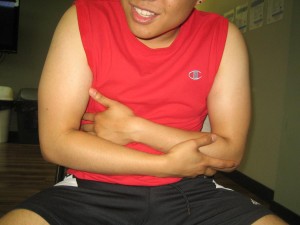Salmonella is a prevalent form of food poisoning brought about by bacteria. The condition is common in the summer season than winter. The condition is generally brief with diarrhea and stomach cramps that lasts for 4-7 days. In some cases, the diarrhea can become severe or last for a longer period. Generally, children are at high risk for the condition.
Aside from children, the elderly, individuals with weak immune systems and those diagnosed with inflammatory bowel disease are also at risk.
What are the signs?
- Diarrhea
- Stomach cramping
- Fever
- Headache
In most cases of salmonella, recovery takes 4-7 days and treatment is not required. - Nausea and/or vomiting
- Appetite loss
Management of salmonella
In most cases of salmonella, recovery takes 4-7 days and treatment is not required. While sick, the individual should drink more fluids to replace those lost by diarrhea.
If the individual is suffering from severe diarrhea or has been sick for more than a week, hospitalization is necessary. At the healthcare facility, treatment includes intravenous fluids.
Antibiotics might be given for infants, elderly, those with a weakened immune system, those suffering from severe diarrhea or high fever or those who have bacteria present in the bloodstream.
Preventive measures
- When preparing food or cooking, always wash hands and utensils, cutting boards and countertops after in contact with raw poultry or meat. Wash hands in between handling different types of food.
- Fresh fruits and vegetables must be washed before eating.
- Food must be cooked based on the recommended safe temperature.
- The refrigerator must be kept below 40 degrees F. Foods that can spoil must be refrigerated. Any prepared food should be stored in the refrigerator within 30 minutes after eating and any fresh foods must be stored right after shopping.
- Keep cold foods cold while hot foods warm.
- Avoid eating or drinking foods that contain raw eggs or unpasteurized milk.
- Thoroughly wash hands using soap after handling lizards, snakes or other reptiles as well as birds or baby chicks.
Disclaimer / More Information
The information posted on this page on salmonella is for learning and educational purposes only. To learn to recognize the signs and how it is managed and prevented, register for first aid training at one of our training centers located throughout Canada. The training centers are in Edmonton, Calgary, Vancouver, Kelowna, Saskatoon, Victoria, Surrey, Mississauga, Winnipeg, Red Deer, Toronto, Ottawa and Halifax.

